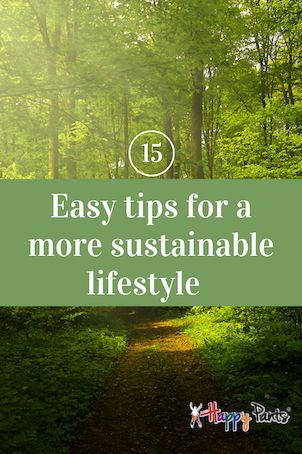The solution is in our hands. We need to start thinking about how we can live today while preserving our limited natural resources and reducing our environmental footprint, bringing us to the idea of sustainability and sustainable living. In 1987 the UN defined sustainability as “meeting the needs of the present without compromising the ability of future generations to meet their needs.” The good news is that you meet your needs while reducing your environmental footprint, becoming an engaged citizen. Just remember that every single action counts. Starting small is a hundred times better than doing nothing at all. Here is a list of 15 easy ways to live more sustainably. Who knows, you might even end up saving some money in the process.
-
Reduce your energy consumption.
You can lower your carbon footprint by
- Check your light bulbs and invest in LED lights, which are more energy-efficient and last longer.
- Unplug all unused appliances.
- Don’t turn on all the lights at once.
- Wash your clothes with cold water.
-
Invest in quality clothing.
Supporting sustainable fashion labels will help you lessen your impact on the environment. Fast fashion is one of the biggest polluter industries in the world.
- Look after your clothes by decreasing the frequency you wash your clothes.
- Hang dry clothes and avoid using electrical driers.
-
Don’t overbuy food.
According to the Australian government, we waste over 7.3 million tonnes of food per year, an average of 300kg per person.
- Check what you have at home and make a list of what you need.
- Don’t throw away leftover food. Save them for your next meal and use them as a base for a new recipe.
-
Compost and learn how to dispose of organic waste.
When you dump organic waste into landfills, it undergoes anaerobic decomposition and produces methane, increasing greenhouse emissions.
- Research and invest in a composting method that suits your lifestyle.
- Turn organic waste into valuable plant fertilisers and rich organic materials.
-
Eat food that is in season.
By purchasing imported food, you encourage fossil fuel energy used in the transportation and refrigeration of those products.
- Eat local food.
- Support local farmers and growers.
-
Grow your produce.
There is no better feeling than growing your food and ensuring that your fruit and veggies are organic and pesticide-free.
- Check how much space you have available and your commitment level.
- If you are short on space or are new to gardening, start with a few posts and grow herbs or leafy greens.
-
Don’t line your garbage bin with plastic bags.
You are contributing to single-use plastics, which take hundreds of years to decompose and contaminate natural resources.
-
Eliminate single-use plastic from your lifestyle.
Carry reusable shopping bags, utensils, straws, food containers, water bottles and more. It might take a little more effort on your part, but by being proactive, you are least likely to be caught off guard.
-
Save water.
Water is one of our most precious resources. It’s also the one that we misuse the most.
- Invest in a water tank
- Reuse rainwater in your garden
- Use a shower timer and a water-saving showerhead
- Close the tab while you are brushing your teeth
-
Use eco-friendly products.
Buy products that are eco-friendly in their manufacturing, ingredient list, and packaging.
- Use cleaning products that won’t contaminate or harm the environment.
- Buy products that use recyclable packaging or are plastic-free.
-
Buy fair trade products.
Companies that commit to ethical and fair-trade products implement sustainable business practices. It ensures safe working conditions for those involved in their product development.
-
Recycle
Before dumping everything into the bin, think if you can recycle that item.
- Recycle paper and cardboard in the appropriate recycling bins or use them in your compost system.
- Check your local council to safely dispose of batteries, mobile phones, computers, and electronics.
- Collect cans and plastic bottles and turn them into cash by using council approved recycling locations.
-
Go paperless.
Next time you are going to print something, get a receipt, or check your bill, see if you can obtain the same information in a digital form.
-
Declutter your digital footprint.
Over the years, we accumulate digital data that is no longer relevant or important. Therefore, it is necessary to get in the habit of checking your digital files, photos, documents, emails and deleting information that you no longer need. It will reduce the energy used in storing that information and consequently reducing your environmental footprint.
-
Spend time in nature.
Connect with nature and explore natural parks, take long walks and exercise outdoors. It is not only good for your body, but it is also fantastic for your mental health.
Let’s all work together by taking part in this green movement to save our planet.



